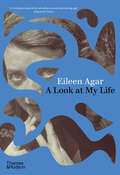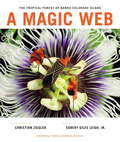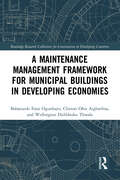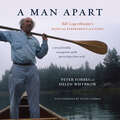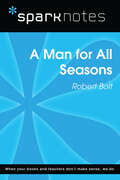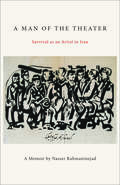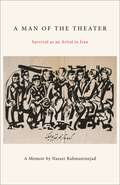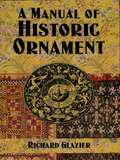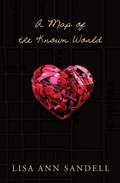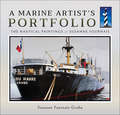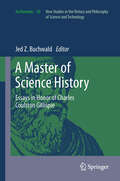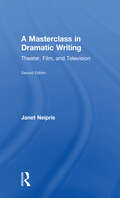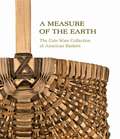- Table View
- List View
A Long Time Ago in a Cutting Room Far, Far Away: My Fifty Years Editing Hollywood Hits—Star Wars, Carrie, Ferris Bueller's Day Off, Mission: Impossible, and More
by Paul HirschA Long Time Ago in a Cutting Room Far, Far Away is a behind-the-scenes look at some of the most influential films of the last 50 years by Paul Hirsch, the film editor who worked on Star Wars, The Empire Strikes Back, Ferris Bueller's Day Off and more than 40 other features. Starting with his work on Carrie, Hirsch gives insight into the production process, touching upon casting, directing, cutting and scoring. It's a riveting look at the decisions that went into creating memorable and iconic scenes and offers fascinating portraits of filmmakers, stars and composers. Part film-school primer, part paean to legendary directors and professionals, the funny yet insightful writing will entertain and inform aficionados and casual moviegoers alike.
A Look at My Life
by Eileen AgarA beautiful new edition of the long out-of-print autobiography of the pioneering Surrealist artist Eileen Agar. Whether dancing on the rooftops in Paris, sharing ideas with Pablo Picasso, or gathering starfish on the beaches of Cornwall, Eileen Agar transformed the everyday into the extraordinary. Her legacy as a pioneering figure in the surrealist movement is firmly established, and her work continues to captivate audiences with its otherworldly beauty and imaginative power. Agar’s life was no less extraordinary than her art. In A Look at My Life, she traces her life from her birth in Argentina to the late 1980s. She gives an intimate account of very different worlds: grand house parties in Buenos Aires and Belgravia as a young girl give way to la vie bohème in London and Paris and a peripatetic existence with her lifelong partner, Hungarian writer Joseph Bard. She enjoyed enriching friendships with contemporaries Paul Nash, Ezra Pound, Evelyn Waugh, Gertrude Hermes, and Henry Moore, while a summer spent in the South of France with Picasso, Lee Miller, and Man Ray had a lasting impact. Agar introduces them and many others into the narrative of her artistic development; above all, it is Agar’s own unwavering resilience, infectious energy, and drive that permeates this compelling memoir. Bringing her work to life in all its vibrancy and variety, this updated autobiography is populated with Agar’s personal selection of photographs of family, friends, and lovers alongside over fifty color illustrations of collages, paintings, and assemblages spanning her life’s work.
A Love Letter Life: Pursue Creatively. Date Intentionally. Love Faithfully.
by Jeremy Roloff Audrey RoloffNEW YORK TIMES BESTSELLERMore than 2.3 million people watched as Jeremy and Audrey Roloff shared their vows and committed their lives to each other. Now for the first time, the former co-stars of TLC's hit show Little People, Big World share their imperfect, resilient, and inspiring love story.As Jeremy and Audrey write, if you can fall into love, you can fall out. True love is something you choose to live out each day through your actions, decisions, and sacrifices. To find and still seek, now that is love. From the moment you meet your potential spouse, you can be intentional about shaping a beautiful love story, uniquely written for who God created you both to be. Whether you're single and searching, in a serious dating relationship, or desiring to love your spouse better, Jeremy and Audrey equip you to pursue an intentional, creative, and faithful love story by sharing theirs.The journey to their wedding day was the culmination of a bumpy and complicated dating relationship. From health problems, to emotional walls, to being separated by one thousand miles, the couple faced daunting obstacles. But their unique approach to dating empowered them to write an uncommon love story and prepared them for married life. Because as beautiful as their wedding was, the Roloffs made a point to prepare more for their marriage than their wedding day.Told through both Jeremy's and Audrey's voices, A Love Letter Life tells a passionate and persevering story of relatable struggles, hard-learned lessons, practical tips, and devout commitment. In these pages, they encourage you to stop settling for convenient relationships, offer perspective on male and female differences in dating, tackle tough topics like purity, give their nine rules for fighting well, suggest fun ideas for connection in a world of technology, and provide fresh advice on how to intentionally pursue a love story that never ends.
A Love Letter to Europe: An outpouring of sadness and hope – Mary Beard, Shami Chakrabati, Sebastian Faulks, Neil Gaiman, Ruth Jones, J.K. Rowling, Sandi Toksvig and others
by Various Melvyn Bragg Lindsey Davis Pete Townshend Chris Cleave Chris Riddell Margaret Drabble Philip Ardagh Mary Beard William Dalrymple Will Hutton Holly Johnson Simon Callow Prue Leith Brian Catling Tony Robinson Tracey Emin Shami Chakrabarti Jonathan Meades Frank Cottrell Boyce J.K. Rowling Jeffrey Boakye Onjali Rauf Peter J ConradiHow are great turning points in history experienced by individuals?As Britain pulls away from Europe great British writers come together to give voice to their innermost feelings. These writers include novelists, writers of books for children, of comic books, humourists, historians, biographers, nature writers, film writers, travel writers, writers young and old and from an extraordinary range of backgrounds. Most are famous perhaps because they have won the Booker or other literary prizes, written bestsellers, changed the face of popular culture or sold millions of records. Others are not yet household names but write with depth of insight and feeling.There is some extraordinary writing in this book. Some of these pieces are expressions of love of particular places in Europe. Some are true stories, some nostalgic, some hopeful. Some are cries of pain. There are hilarious pieces. There are cries of pain and regret. Some pieces are quietly devastating. All are passionate.Conceived as a love letter to Europe, this book may also help reawaken love for Britain. It shows the unique richness and diversity of British cultures, a multitude of voices in harmony.Contributors include:Hugh Aldersey-Williams, Philip Ardagh, Jake Arnott, Patricia Atkinson, Paul Atterbury, Richard Beard, Mary Beard, Don Boyd, Melvyn Bragg, Gyles Brandreth, Kathleen Burke, James Buxton, Philip Carr, Brian Catling, Shami Chakrabarti, Chris Cleave, Mark Cocker, Peter Conradi , Heather Cooper, Frank Cottrell-Boyce, Roger Crowley, David Crystal, William Dalrymple, Lindsey Davies, Margaret Drabble, Mark Ellen, Richard Evans, Michel Faber, Sebastian Faulks, Ranulph Fiennes, Robert Fox, James Fox, Neil Gaiman, Evelyn Glennie, James Hanning, Nick Hayes, Alan Hollinghurst, Gabby Hutchinson-Crouch, Will Hutton, Robert Irwin, Holly Johnson , Liane Jones, Ruth Jones, Sam Jordison, Kapka Kassabova, AL Kennedy, Hermione Lee, Prue Leith, Patrick Lenox, Roger Lewis, David Lindo, Penelope Lively, Beth Lync, Richard Mabey, Sue MacGregor, Ian Martin, Frank McDonough, Jonathan Meades, Andrew Miller, Deborah Moggach, Ben Moor, Alan Moore, Paul Morley, Jackie Morris, Charles Nicholl, Richard Overy, Chris Riddell, Adam Roberts, Tony Robinson, Lee Rourke, Sophie Sabbage, Marcus Sedgwick, Richard Shirreff, Paul Stanford, Isy Suttie, Sandi Toksvig, Colin Tudge, Ed Vulliamy, Anna Whitelock, Kate Williams, Michael Wood, Louisa Young
A Love Letter to the City
by Stephen Powers Peter EleeyStretched across city walls and along rooftops, Stephen Powers's colorful large-scale murals sneak up on you. "Open your eyes / I see the sunrise," "If you were here I'd be home," "Forever begins when you say yes." What at first looks like nothing as much as an advertisement suddenly becomes something grander and more mysterious—a hand-painted love letter at billboard size. Combining community activism and public art, Powers and his team of sign mechanics collaborate with a neighborhood's residents to create visual jingles— sincere and often poignant affirmations and confessions that reflect the collective hopes and dreams of the host community. A Love Letter to the City gathers the artist's powerful public art project for the first time, including murals on the walls and rooftops of Brooklyn and Syracuse, New York; Philadelphia; Dublin and Belfast, Ireland; São Paolo, Brazil, and Johannesburg, South Africa.
A Love Letter to the City
by Stephen PowersStretched across city walls and along rooftops, Stephen Powers's colorful large-scale murals sneak up on you. "Open your eyes / I see the sunrise," "If you were here I'd be home," "Forever begins when you say yes." What at first looks like nothing as much as an advertisement suddenly becomes something grander and more mysterious--a hand-painted love letter at billboard size. Combining community activism and public art, Powers and his team of sign mechanics collaborate with a neighborhood's residents to create visual jingles-- sincere and often poignant affirmations and confessions that reflect the collective hopes and dreams of the host community. A Love Letter to the City gathers the artist's powerful public art project for the first time, including murals on the walls and rooftops of Brooklyn and Syracuse, New York; Philadelphia; Dublin and Belfast, Ireland; São Paolo, Brazil, and Johannesburg, South Africa.
A Mad Love: An Introduction to Opera
by Vivien SchweitzerA lively introduction to opera, from the Renaissance to the twenty-first centuryThere are few art forms as visceral and emotional as opera-and few that are as daunting for newcomers. A Mad Love offers a spirited and indispensable tour of opera's eclectic past and present, beginning with Monteverdi's L'Orfeo in 1607, generally considered the first successful opera, through classics like Carmen and La Boheme, and spanning to Brokeback Mountain and The Death of Klinghoffer in recent years. Musician and critic Vivien Schweitzer acquaints readers with the genre's most important composers and some of its most influential performers, recounts its long-standing debates, and explains its essential terminology. Today, opera is everywhere, from the historic houses of major opera companies to movie theaters and public parks to offbeat performance spaces and our earbuds. A Mad Love is an essential book for anyone who wants to appreciate this living, evolving art form in all its richness.
A Magic Web
by Christian Ziegler Egbert Giles LeighThe tropical forest of Panama's Barro Colorado Island is a luxuriant community of plants and animals, pulsating with life and offering an astonishing view of nature's myriad processes. What does the forest look like? How do the activities of the forest's plants and animals create a community?In A Magic Web, photographer Christian Ziegler and evolutionary biologist Egbert Giles Leigh, Jr., invite readers to enter the marvelous world of Barro Colorado Island. This book is a unique combination of spectacular photography and clear, authoritative text written by an active scientist who has spent half a lifetime trying to understand the tropical forest. Luscious photographs of the forest reveal the wonderful diversity of its inhabitants and show many of the activities that give it its character and lend structure to its community. Drawing on decades of work on Barro Colorado Island, Egbert Leigh explains how the forest works: how plants and animals compete with but also depend on each other; how the solitary lives of cats contrast with the intricately organized lives of armies of ants; the variety of ways plants struggle for a place in the sun; and how these plants attract animals to pollenate their flowers. Finally, the book shows the importance of tropical forests to the people living near them, why they matter to the world at large, what we can learn from them, and how they differ from temperate-zone forests.Full of stunning full-color photographs accompanied by clear and accessible text, A Magic Web is a must for anyone planning to visit a tropical forest and for all those who wish they could.
A Maintenance Management Framework for Municipal Buildings in Developing Economies (Routledge Research Collections for Construction in Developing Countries)
by Clinton Aigbavboa Wellington Didibhuku Thwala Babatunde Fatai OgunbayoThe central aim of this book is to investigate and develop frameworks to aid effective maintenance management of municipal buildings in the education sector of developing economies. Using the South African education sector as a case study, this book provides readers with two major practical insights. Firstly, it focuses on the theoretical underpinnings of maintenance management research and introduces a maintenance management model through the development of a conceptual framework. This framework aids in explaining the factors underpinning the maintenance of municipal buildings but can also be used in the assessment and management of other public buildings. Secondly, the book highlights and addresses theoretical gaps in existing studies essential for the maintenance management of buildings in developing economies, providing a stimulus for future research. The book will be of interest to researchers in construction management, building technology, estate management, civil engineering, architecture, and urban and regional planning. It is an essential manual for policymakers in the education sector, built environment, construction industry, facility maintenance, facility management and consultants at government ministries, departments, and agencies (MDAs) charged with maintenance management of public infrastructures and assets.
A Man & His Car: Iconic Cars and Stories from the Men Who Love Them
by Matt HranekMan-about-town and NYC men&’s style fixture Matt Hranek is back with his second book, A Man & His Car. Here is a beautiful homage to an object of men&’s obsession, told in firsthand and original interviews. Jay Leno, a major car collector and the host of Jay Leno&’s Garage, shares the story of his oldest car, a 1955 Buick Roadmaster that he bought for $350, which he literally slept in before getting his break in L.A. Kevin Costner reveals that he got so attached to the iconic Shelby Mustang he drove in the movie Bull Durham, he bought it for his own personal collection. Franz von Holzhausen, chief designer at Tesla, who worked hand in hand with Elon Musk to design the Tesla Model S prototype, says that his love of cars started when he was two (as evidenced by a picture of him sitting in a high chair drawing a car). And as for Snoop Dogg and his 1965 Cadillac &“Snoop DeVille&” convertible—do we even need to explain?A Man & His Car includes visits to some of the most exclusive collections in the world—from that of the Petersen Automotive Museum to those of car manufacturers from Fiat to Ford—giving us access to Steve McQueen&’s favorite car, a 1956 Jaguar XKSS; the 1971 DeTomaso Pantera that Elvis purchased for his then-girlfriend Linda Thompson (and which has two bullet holes in the steering wheel and one in the driver&’s-side floorpan from when, after an altercation with Thompson, Presley fired three rounds into the interior when the car wouldn&’t start); and a super-rare, 24-karat-gold-plated 1980 DeLorean DMC-12, a model that was sold exclusively to American Express Gold Card members through the 1980 American Express catalog, for an astronomical $85,000 (equivalent to more than $250,000 today). Exquisite photos of each car accompany each story, and since cars naturally hold more detail than watches, there will be more photos in this book—of the cars head-on, of their hood ornaments and wheels, and of course full-body shots. With Hranek&’s storytelling, the cars become more than just vehicles for transportation and status symbols; they represent pop-culture moments, pioneering achievements, heirlooms, friendships, and more.
A Man Apart: Bill Coperthwaite's Radical Experiment in Living
by Peter Forbes Helen WhybrowA story of friendship, encouragement, and the quest to design a better worldA Man Apart is the story—part family memoir and part biography—of Peter Forbes and Helen Whybrow&’s longtime friendship with Bill Coperthwaite (A Handmade Life), whose unusual life and fierce ideals helped them examine and understand their own.Coperthwaite inspired many by living close to nature and in opposition to contemporary society, and was often compared to Henry David Thoreau. Much like Helen and Scott Nearing, who were his friends and mentors, Coperthwaite led a 55-year-long &“experiment in living&” on a remote stretch of Maine coast. There he created a homestead of wooden, multistoried yurts, a form of architecture for which he was known around the world.Coperthwaite also embodied a philosophy that he called &“democratic living,&” which was about empowering all people to have agency over their lives in order to create a better community. The central question of Coperthwaite&’s life was, &“How can I live according to what I believe?&”In this intimate and honest account—framed by Coperthwaite&’s sudden death and brought alive through the month-long adventure of building with him what would turn out to be his last yurt—Forbes and Whybrow explore the timeless lessons of Coperthwaite&’s experiment in intentional living and self-reliance. They also reveal an important story about the power and complexities of mentorship: the opening of one&’s life to someone else to learn together, and carrying on in that person&’s physical absence.While mourning Coperthwaite&’s death and coming to understand the real meaning of his life and how it endures through their own, Forbes and Whybrow craft a story that reveals why it&’s important to seek direct experience, to be drawn to beauty and simplicity, to create rather than critique, and to encourage others.
A Man Called Harris: The Life of Richard Harris
by Anthony Galvin Michael SheridanRichard Harris was a giant who oozed charisma on screen. But off screen he was troubled and addicted to every pleasure life could offer. Coming from a repressed Irish Catholic background, he was forced by a teenage illness to abandon his beloved rugby, but not his macho appetites. Discovering theatre saved him. He had found his calling. Despite marrying the daughter of a peer, he never tried to fit in. He was always a hell-raiser to the core, along with legendary buddies Richard Burton and Peter O’Toole. But he was more; he was a gifted poet and singer. He was an intelligent family man who took great interest in his craft, a Renaissance man of the film world. Every time his excesses threatened to kill his career – and himself – he rose magnificently from the ashes, first with an Oscar-winning performance as Bull McCabe in The Field, then in the Harry Potter franchise.
A Man and His Watch: Iconic Watches and Stories from the Men Who Wore Them
by Matt Hranek“I’ve paged through stacks of books on the history of watches. . . . But I hadn’t come across a book that actually moved me until I picked up A Man and His Watch. The volume is filled with heartfelt stories.”—T: The New York Times Style Magazine Paul Newman wore his Rolex Daytona every single day for 35 years until his death in 2008. The iconic timepiece, probably the single most sought-after watch in the world, is now in the possession of his daughter Clea, who wears it every day in his memory. Franklin Roosevelt wore an elegant gold Tiffany watch, gifted to him by a friend on his birthday, to the famous Yalta Conference where he shook the hands of Joseph Stalin and Winston Churchill. JFK’s Omega worn to his presidential inauguration, Ralph Lauren’s watch purchased from Andy Warhol’s personal collection, Sir Edmund Hillary’s Rolex worn during the first-ever summit of Mt. Everest . . . these and many more compose the stories of the world’s most coveted watches captured in A Man and His Watch. Matthew Hranek, a watch collector and NYC men’s style fixture, has traveled the world conducting firsthand interviews and diving into exclusive collections to gather the never-before-told stories of 76 watches, completed with stunning original photography of every single piece. Through these intimate accounts and Hranek’s storytelling, the watches become more than just timepieces and status symbols; they represent historical moments, pioneering achievements, heirlooms, family mementos, gifts of affection, and lifelong friendships.
A Man for All Seasons (SparkNotes Literature Guide Series)
by SparkNotesA Man for All Seasons (SparkNotes Literature Guide) by Robert Bolt Making the reading experience fun! Created by Harvard students for students everywhere, SparkNotes is a new breed of study guide: smarter, better, faster. Geared to what today's students need to know, SparkNotes provides: *Chapter-by-chapter analysis *Explanations of key themes, motifs, and symbols *A review quiz and essay topicsLively and accessible, these guides are perfect for late-night studying and writing papers
A Man of the Theater: Survival as an Artist in Iran
by Nasser RahmaninejadLife in Iran as an artist under the Shah and during the Iranian RevolutionA Man of the Theater tells the personal story of a theater artist caught between the two great upheavals of Iranian history in the 20th century. One is the White Revolution of the 1960s, the incomplete and uneven modernization imposed from the top by the dictatorial regime of the Shah, coming in the wake of the overthrow of the popular Mosaddegh government with the help of the CIA. The other one is the Iranian Revolution of 1979, a great rising of Iranian society against the rule of the Shah in which Khomeini’s Islamist faction ends up taking power. Written in a simple direct style, Rahmaninejad’s memoir describes his fraught creative life in Tehran during these decades, founding a theater company and directing plays under the increasing pressure of the censorship authorities and the Shah’s secret police. After being arrested and tortured by the SAVAK and after spending years in Tehran’s infamous Evin prison and being a cause célèbre of Amnesty International, Rahmaninejad is freed by the Revolution of 1979. But his new-found freedom is short-lived; the progressive intellectuals and artists find themselves overpowered and outmaneuvered by the better organized Islamists, leading to renewed terror and to exile. In Western perception, the Iranian Revolution, which this year has its 40th anniversary, often overshadows the decades of Iran’s modern history that preceded it. A Man of the Theater fills this gap. The title derives from a time of torture in prison when interrogators ordered him to write everything about his activities. To avoid revealing anything incriminating he took pen in hand and wrote and wrote about all his artistic passions, beginning, "Here it is—this is my life! I am an artist! A man of the theater!"
A Man of the Theater: Survival as an Artist in Iran
by Nasser RahmaninejadLife in Iran as an artist under the Shah and during the Iranian RevolutionA Man of the Theater tells the personal story of a theater artist caught between the two great upheavals of Iranian history in the 20th century. One is the White Revolution of the 1960s, the incomplete and uneven modernization imposed from the top by the dictatorial regime of the Shah, coming in the wake of the overthrow of the popular Mosaddegh government with the help of the CIA. The other one is the Iranian Revolution of 1979, a great rising of Iranian society against the rule of the Shah in which Khomeini’s Islamist faction ends up taking power. Written in a simple direct style, Rahmaninejad’s memoir describes his fraught creative life in Tehran during these decades, founding a theater company and directing plays under the increasing pressure of the censorship authorities and the Shah’s secret police. After being arrested and tortured by the SAVAK and after spending years in Tehran’s infamous Evin prison and being a cause célèbre of Amnesty International, Rahmaninejad is freed by the Revolution of 1979. But his new-found freedom is short-lived; the progressive intellectuals and artists find themselves overpowered and outmaneuvered by the better organized Islamists, leading to renewed terror and to exile. In Western perception, the Iranian Revolution, which this year has its 40th anniversary, often overshadows the decades of Iran’s modern history that preceded it. A Man of the Theater fills this gap. The title derives from a time of torture in prison when interrogators ordered him to write everything about his activities. To avoid revealing anything incriminating he took pen in hand and wrote and wrote about all his artistic passions, beginning, "Here it is—this is my life! I am an artist! A man of the theater!"
A Manual of Historic Ornament
by Richard GlazierExceptionally comprehensive, easy-to-use guide surveys the evolution of historic ornament in architecture and the applied arts — from primitive ornaments of Oceania, Egypt, and Assyria to a Gothic doorway in Amiens, the tomb of Lorenzo de Medici, and a classic early-19th-century sofa by Thomas Hope. Over 700 black-and-white illustrations. 16 plates of photographs.
A Map of the Known World
by Lisa Ann SandellCora Bradley dreams of escape. Ever since her reckless older brother, Nate, died in a car crash, Cora has felt suffocated by her small town and high school. She seeks solace in drawing beautiful maps, envisioning herself in exotic locales.
A Marine Artist's Portfolio: The Nautical Paintings of Susanne Fournais
by Susanne Fournais GrubeSusanne Fournaise Grube, has been painting marine scenes for over thirty years, during which time, she has produced a large portfolio of material, not only depicting ships and small craft, but also the architecture of marine buildings and light houses. This volume, for the first time , presents a good selection of her work, looking at most aspects of the artists subject matter. The book covers subjects painted for clients, both corporate and private, also including some material painted just for pleasure. Overall the work, is a good selection of material produced over many years, that is for the first time in the public domain.
A Master of Science History: Essays in Honor of Charles Coulston Gillispie (Archimedes #30)
by Jed Z. BuchwaldNew essays in science history ranging across the entire field and related in most instance to the works of Charles Gillispie, one of the field's founders.
A Masterclass in Dramatic Writing: Theater, Film, and Television
by Janet NeiprisA Masterclass in Dramatic Writing is an essential tool for professional teachers in academic programs training successful Playwrights, Screenwriters, and TV writers, as well as anyone who wants to write a completed dramatic script. You can become a successful dramatic writer within a group or by yourself. This focused and engaging book is organized as a one-semester course. The chapters guide the writer week-by-week and step-by-step resulting in the completion of a first draft and a rewrite of an original script. The fourteen chapters are each accompanied by Weekly Exercises and progressive Assignments. In this expanded and updated edition, Neipris integrates her widely used To Be A Playwright, into a master class for playwrights, screenwriters and TV writers. New Chapters include: THE MORAL RESPONSIBILITY OF THE WRITER ONE WRITER’S LIFE BEGINNINGS- WHERE IDEAS ORIGINATE COMEDY CHECKPOINTS ADAPTATION –FILM, THEATER, AND TELEVISION PUTTING IT TOGETHER -- CONSTRUCTING A FULL LENGTH SCRIPT LESSONS FROM MASTER TEACHERS AND STUDENTS Janet’s legacy as an educator, mentor, and artists is legendary. This book is a gift to the profession and the art. Brandon Jacobs-Jenkins
A Masterclass in Dramatic Writing: Theater, Film, and Television
by Janet NeiprisA Masterclass in Dramatic Writing addresses all three genres of dramatic writing - for theatre, film and TV - in a comprehensive, one-semester, 14-week masterclass for the dramatic writer.This book is tightly focused on the practical outcome of completing a first draft and first rewrite of a dramatic work, drawing on Professor Janet Neipris’ many years of experience as the head of Dramatic Writing at NYU Tisch. The fourteen chapters, organized like a semester, take the reader week-by-week and step-by-step through writing a first draft of an original play, screenplay, or TV pilot, while also teaching the core principles of dramatic writing. Chapters include Beginnings, Creating Complex Characters, Dialogue, Escalating Conflicts, Endings, Checkpoints, Comedy, and Adaptation, and there are Weekly Exercises and progressive Assignments.This book is perfect for professional writers, teachers, and students of dramatic writing, as well as anyone who wants to complete their first dramatic work.An award-winning playwright and Professor of Dramatic Writing at NYU, Janet Neipris has written for Screen and Television. She has also taught dramatic writers at UCLA and in China, Australia, Indonesia, South Africa, Italy, and in the UK at Oxford, CSSD, University of Birmingham, and the University of East Anglia. Previous publications include To Be A Playwright (Routledge 2006). Janet Neipris’s plays and letters are in the Theatre Collection of Harvard University’s Houghton Library. For more, see www.janetneipris.com.
A Masterpiece for Bess
by Lara BergenFlattered at first that all the other fairies and sparrow men want her to paint their portraits, Bess soon begins to feel overwhelmed and tries to find a way to return to the kind of painting she really wants to do.
A Matter of Appearance: A Memoir
by Emily WellsA dazzling memoir of chronic illness that explores the fraught intersection between pain, language, and gender, by a debut author.Emily Wells spent her childhood dancing through intense pain she assumed was normal for a ballerina pushing her body to its limits. For years, no doctor could tell Wells what was wrong with her, or they told her it was all in her head.In A Matter of Appearance, Wells traces her journey as she tries to understand and define the chronic pain she has lived with all her life. She draws on the critical works of Freud, Sontag, and others to explore the intersection between gender, pain, and language, and she traces a direct line from the &“hysteria patients&” at the Salpêtrière Hospital in nineteenth-century Paris to the contemporary New Age healers in Los Angeles, her stomping ground. At the crux of Wells&’ literary project is the dilemma of how to diagnose an experience that is both private and public, subjective and quantifiable, and how to express all this in words.&“Gorgeously written and brilliantly argued, A Matter of Appearance uses chronic illness as a lever to investigate the life of a body. It&’s complex, inconclusive, and incredibly clear-eyed. Moving fluidly between histories of psychoanalysis, desire, ambition, pathology, Wells reminds us of the liminal state we all live in between sickness and health.&”—Chris Kraus, author of Aliens & Anorexia and Summer of Hate
A Measure of the Earth
by Henry Glassie Nicholas R. BellA Measure of the Earth provides an unparalleled window into an overlooked corner of recent American history: the traditional basketry revival of the past fifty years. Steve Cole and Martha Ware amassed a remarkable collection using the most stringent guidelines: baskets made from undyed domestic materials that have been harvested by the maker. An essay by Nicholas Bell details the long-standing use of traditional fibers such as black ash and white oak, willow and sweetgrass, and the perseverance of a select few to claim these elements--the land itself--for the enrichment of daily life. As they trek through woods, fields, farm, and shore in the quest for the right ingredients for a basket, these men and women cultivate an enviable knowledge of the land. Each basket crafted from this knowledge provides not only evidence of this connection to place, but also a measure of the earth.Drawing on conversations with the basketmakers from across the country and reproducing many of their documentary photographs, Bell offers an intimate glimpse of their lifeways, motivations, and hopes. Lavish illustrations of every basket convey the humble, tactile beauty of these functional vessels.

